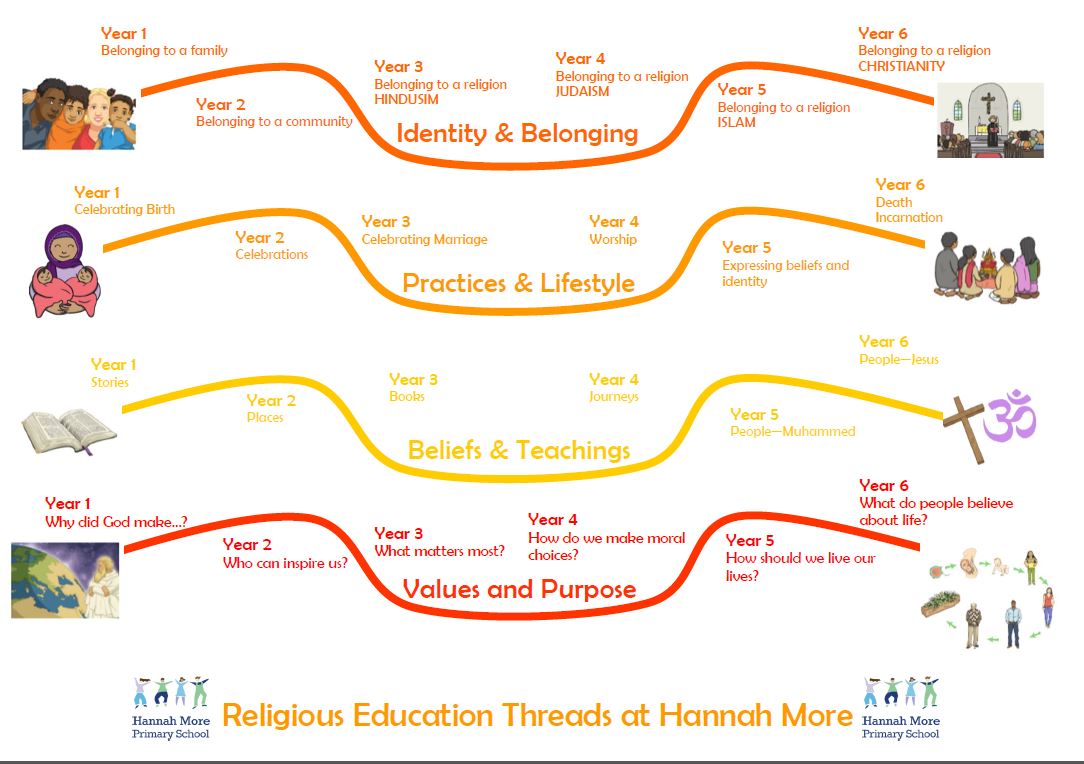Religious Education Threads

Intent
At Hannah More, Religious Education has a significant role for the development of pupils’ spiritual, moral, social and cultural development. It promotes respect and open-mindedness towards others with different faiths and beliefs and encourages pupils to develop their sense of identity and belonging through self-awareness and reflection.
In line with the Bristol Agreed Syllabus for Religious Education, R.E. lessons at Hannah More provoke challenging questions about the meaning and purpose of life, beliefs about God, ultimate reality, right and wrong and what it means to be human. We encourage pupils to learn about religious and non-religious worldviews in order to discover, explore and consider different answers to these questions. Pupils then learn to interpret, analyse, evaluate and critically respond to the claims that religious and non-religious worldviews make.
Much of the discussions that take place during R.E lessons are underpinned by our Oracy talk structures. These help pupils to express their opinions and to agree or disagree respectfully. In addition to this, visits to different places of worship within our local area help to bring Religious Education to life and play a part in developing the children’s cultural capital.
Implementation
We use the Locally Agreed Syllabus of Awareness Mystery Value for Religious Education developed for Bristol as the basis for our curriculum. At Hannah More Primary School, it has been agreed, having considered the requirements and guidelines presented in the Agreed Syllabus, that the following religions are studied:
These are taught through one specific ‘RE Day’ each term. Where there are religious celebrations such as Diwali, Christmas, Eid or Easter, extra RE Days are taught based on these themes.
Lessons are structured in such a way so that children across the school are both learning about religion and beliefs and learning from religion and beliefs. Children learn about religion and beliefs through exploring a range of religious stories, texts and celebrations, recognising similarities and differences between and within religions and learning about how religious practices are related to beliefs and teachings. Children learn from religion and beliefs by reflecting on what matters to them, reflecting on the moral values of rights and wrong and recognising that there are similarities and differences between theirs and others lives.
As well as learning about RE through specific RE lessons, children at Hannah More are also provided with a range of extra experiences and enrichment opportunities that contribute to their RE learning. These include having the opportunity to handle artefacts, explore texts, meet visitors from local religious communities, participate in quiet reflection during assemblies and make visits to local places of worship.
During EYFS, pupils explore religious education through a combination of child initiated and adult directed activities.
They have the opportunities to:
Impact
The children at Hannah More enjoy learning about other religions and why people choose, or choose not to follow a religion. Through their R.E. learning, the children are able to make links between their own lives and those of others in their community and in the wider world. They develop a religious vocabulary and interpret religious symbolism in a variety of forms and reflect on questions of meaning, offering their own thoughtful and informed insights into religious and secular world-views.
Children’s work in RE is assessed while observing them working during lessons. Questioning is used to form part of the teacher assessment and evidence is collected in pupils exercise books and the class floor book which acts as a ‘snapshot’ of the learning that takes place.
